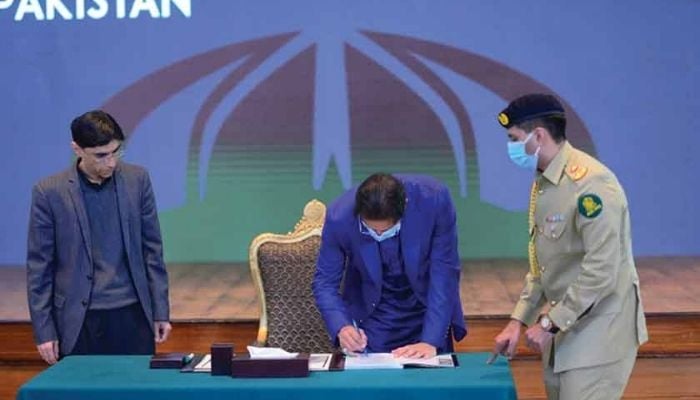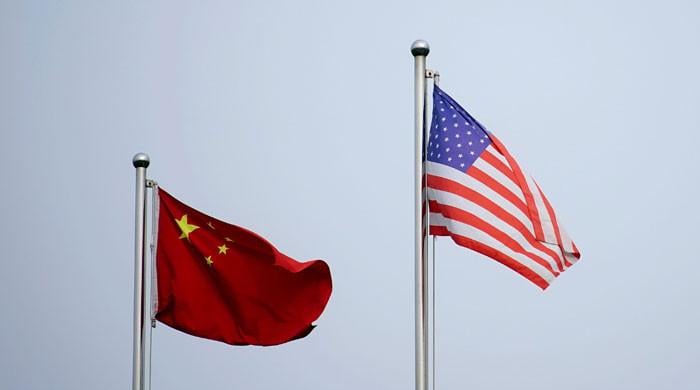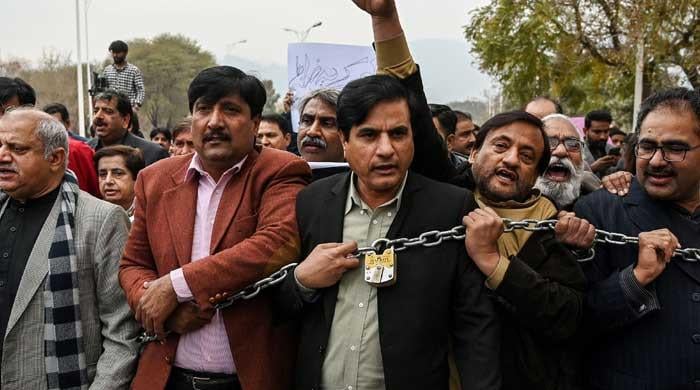The NSP: Beset by grand ambitions and unrealistic ideas
'NSP is a paper boat of geo-economics floundering in the tsunami of misgovernance by the hybrid regime'
February 09, 2022

A reinvented wheel with spokes of jargon, cliche, and complacency was presented last month as the National Security Policy (NSP), a more comprehensive version of the Internal Security Policy instituted in 2014. Ceding Indian-occupied Kashmir (IIOJK) to Modi, lacking the legitimacy of consent by citizens, addled with received ideas, and divorced from actual practice, the NSP is a paper boat of geo-economics floundering in the tsunami of misgovernance by the hybrid regime.
The mere existence of the NSP helps, nonetheless. Policymakers of the future might discover new ways to promote “unity in diversity” and cherish our “ethnic, religious, cultural, and linguistic diversity.” In the here and now, however, the challenges of missing persons in Balochistan and Khyber Pakhtunkhwa, PTM, and full constitutional rights to Fata citizens would require to be met democratically and lawfully. The odds are slim.
The NSP spreads the notion of security so wide that it has become meaninglessly shallow. Suffixing ‘security’ after “equitable development of smaller cities, skills development, market-based energy sector, justice system, [and] population stabilisation” does not make it so. This wide-ranging concept is useful for war-course participants, but as national policy it manifests policymakers’ failure to think clearly and to make meaningful distinctions. If everything is security, nothing is.
IK’s notion of the state as an aid-organisation sinks the human security aspect of the NSP. Dignity of citizens requires kaar-khana, not langar-khana; salary, not hand-outs; hunar-gah, not panaah-gah; employment, not charity. The only signpost in the NSP to achieve human as well as economic security is a concept ill-understood and ill-used by this regime: geo-economics.
The NSP reinvents the wheel of geo-economics that was invented at least eight years ago. Signed in 2015, the China-Pakistan Economic Corridor (CPEC) remains the greatest initiative on geo-economics taken by any Pakistani government. The Turkmenistan-Afghanistan-Pakistan-India gas pipeline is geo-economics. Islamabad’s first-ever defence-cooperation agreement with Russia in 2014 is geo-economics. Pakistan’s full membership of the Shanghai Cooperation Organization in 2017 is geo-economics.
Geo-economics in action is Islamabad hosting presidents of Iran, Turkey, and Central Asian Republics for the 2017 summit of the Economic Cooperation Organisation (ECO). Blazoned behind the heads of ECO countries five years ago was the theme: ‘Prosperity through Regional Connectivity’.
A ‘policy’ is a guideline to allocate and align state resources with state objectives, to prioritise among objectives, and to reflect current practice. Here the NSP was doomed even before the ink dried on its paper. Will funding for “equitable development of smaller cities, skills development, market-based energy sector, justice system, population stabilisation” get substantially enhanced and the budget for security slashed? Unlikely. If not reflected in resource-allocation, good intentions and fashionable jargon will remain words on paper.
The NSP lacks legitimacy. Its paragraph on “policy formulation” does not mention parliament. No Standing Committee scrutinised the draft. The Kashmir Committee groped in the dark until the NSP was published. IK announced the policy in the PM Secretariat on a morning when both houses of parliament were in session. It was not laid in either and has not been since. The irony is profound. This self-avowed “citizen-centric” policy has no consent of the citizenry for whose security the policy was formed.
The Pakistani people are not the intended audience of the NSP, which lays out the worldview our security state wishes to articulate to the West, principally the United States. Why? Because the US and its allies in the International Security Assistance Force and the North Atlantic Treaty Organisation have been irritated with Pakistan over Afghanistan for over a decade. And they have not been quiescent. Practising geo-economics, they have retaliated against Pakistan through the Financial Action Task Force and the International Monetary Fund (IMF).
The NSP is an affidavit of good conduct from a regime reeling after the US withdrawal from Afghanistan. From 2022 onwards, the NSP promises, Pakistan will not play security games. Pakistan will instead seek peace and connectivity with its neighbours – begin to pursue policies the rest of the world adopted after the fall of the Berlin Wall three decades earlier. And the unwritten plea: we will play nice, please begin sending us aid again.
IIOJK merits a mere one percent of the 11,000 words in the NSP and dares not mention reversal of Modi’s 2019 annexation of IIOJK as one of Pakistan’s principal national security objectives. The NSP is bereft of a single word of fresh thinking on how to achieve a “peaceful and just resolution” of the Kashmir issue.
With a commitment to “safeguarding [Pak] sovereignty in all its manifestations”, the NSP was released less than twelve hours after the regime bulldozed the State Bank Amendment Bill in the National Assembly. Under IMF pressure, the IK-regime has self-amputated the monetary policy arm of the state and compromised economic as well as defence sovereignty of the nation.
The bravado of “a policy of zero-tolerance for any groups involved in terrorist activities on its soil” is belied by the still-secret October 2021 agreement and by no less than six other previous agreements the state has signed with the TLP. The president’s September 2021 offer of amnesty to the TTP, repeated by the foreign minister, contradicts the NSP flagrantly. The TTP rejected the offer a few days later. A recidivist regime signed a ceasefire with the TTP in November 2021, which the TTP refused to extend a month later.
The NSP provides scant guidance in dealing with grisly facts. In 2021, terrorist attacks increased by 42 percent and casualties increased by 52 percent. Terrorists killed 335 Pakistanis in 2021, including 177 security personnel and 126 civilians, while the injured totaled 555 as a result of 207 incidents. Terrorist attacks in Kech, Nushki, and Panjgur in Baluchistan in just one week are stark reminders of a security challenge that, instead of abating, is deepening after the Taliban takeover of Afghanistan.
The actual conduct of security and foreign policies by the IK-regime controverts the NSP. If better relations with the US are the objective, IK’s “absolutely not” and “shackles of slavery” make no sense. If better relations with China are the objective, the scuttling of CPEC makes no sense. If better relations with Saudi Arabia are the objective, the foreign minister’s lashing-out in August 2020 makes no sense. IK’s statements on Modi, India, and Kashmir continue a sorry saga of confusion, ignorance, and appeasement.
The pitfalls of a polarising globe will not be surmounted with empty proclamations such as “Pakistan does not subscribe to ‘camp politics’.” On one side is the US allied with India in the Indo-Pacific against China and hurting Pakistan at the FATF, IMF, and the Nuclear Suppliers Group. On the other side is China stunned by the confusion and paralysis of this regime. IK’s visit to China this week highlights the perils of the strategic tightrope that Pakistan must walk. The NSP is no help in making the hard choices that lie ahead.
“No matter how intellectually compelling,” writes one expert, “strategic goals have little meaning unless married with the military, economic, and diplomatic means required to achieve them.” Proclaimed by an incapacitated regime, the NSP is wordplay beset by grand ambitions and unrealistic ideas. It will remain a stunted potted-plant on the porch of the perennially powerful. Lacking any roots in the soil of the people, the NSP will not flourish.
One would be happier to have a two-sentence NSP. One, that no organ whatsoever of the state will aid and support any violent non-state organisation. And two, that the state will abide by and fulfill the promises made to the people in the preamble and fundamental-rights chapter of the constitution. More than enough security in that.
The writer is a member of the National Assembly. These are his personal views. He tweets @kdastgirkhan











